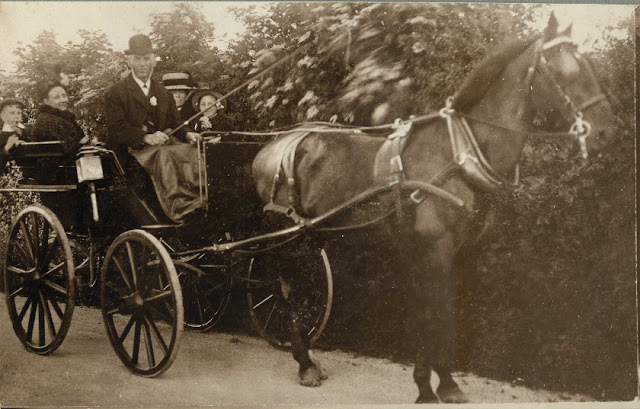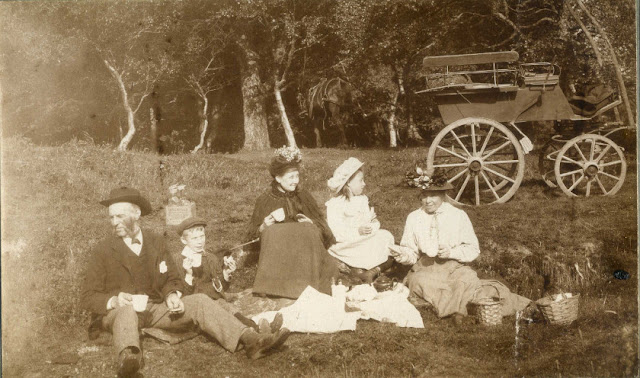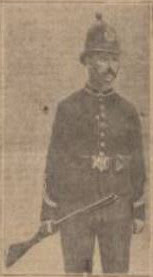Featured
- Get link
- X
- Other Apps
P. C. Beck at Upwey 1903-1908
Policemen are often called as witnesses in court cases, this is useful for me, to trace Grandad Beck's movements around the county. While researching today's post I found Grandad Beck was a witness for a case involving Upwey in July 1903. Which means that the family moved from Lyme Regis sometime previously or possibly at the end of 1902. I had thought they moved the following year in 1904 and this post mention the later date. The further back I go the less information I can find, the newspaper reports are shorter and a Constable appears less often then Superintendents.
From 1903 to 1908 I have written about four cases, the first three Granddad Beck as P.C. Beck is mentioned and the last one because it was unusual. Upwey was an interesting posting, in 1903 this was under the Portland Division which, until the New Portland Police station was built, held the divisional courts in Weymouth. Weymouth had its own Borough Police force, this must have been a challenge for Grandad Beck. Traffic and people moved between the two which required the two forces to work together on some cases. In addition the railway went though Upwey, this would have been the first time Grandad Beck had a beat on a railway line. These cases give us a good idea of the range of incidents that had to be dealt with by the police. Portland had a large naval base and visiting sailors caused the problems in the first case.
I have chosen 2 photographs from the albums that are likely to have been taken around this time. Unfortunately we have no clue as to where they were taken.
 |
| May and Lionel going on a picnic with Mum, Dad (taking the photo) Granny and Grandad (Eli, driving and Fanny or Francis Beck) |
Theft of spoons and forks by Bluejackets
In July 1903 15 blue-jackets from H.M.S. Royal Sovereign, were charged with stealing 14 spoons and 15 forks. The 14 sailors went to the Strawberry gardens, Upwey by char-a-bane and had a strawberry tea at Upwey Wishing Well tea room. After they paid and left they took with them the 14 spoons and 15 forks worth £1 5s 6d. As valued by Tom English, the proprietors son.
This seems to have been some skylarking that went wrong. The sailors put the cutlery down John Wilkins flannel. After tea they went to the Spa Hotel a public house in nearby Radipole. Here Wilkins felt something pricking him, and then he discovered the forks and spoons. With the help of his mate William Stedman, he asked the landlord Alexander Stevens for some paper and used it to wrap up the spoons and forks, he produced from his jumper. All the men appeared sober but were jolly. Wilkins told the court he was "half seas over" and that he intended to return the cutlery the next day.
Next day P. C. Beck went to the ship as he had seen the able seamen at Upwey and was able to identify some of them. Grandad Beck had cautioned 3 of the men for being on the swing all at the one time. Another man went into the school and wrote the name of his ship in a drawing book. He told the court that when he saw the men at Upwey they appeared to be sober.
Wilkins and Stedman were both fined and the cases against the other sailors dismissed, though the magistrates thought that the elder defendants especially ought to have taken steps, when they saw what was going on, to see that the property was restored.
Extraordinary Traffic
In April 1904 Grandad Beck was at Weymouth giving evidence against George Blake. P. C. Beck had timed Blake's traction engine, as it was driven through Upwey, at a speed of over seven miles an hour. The speed limit at the time was two miles an hour through towns and villages and four miles in the country. Villagers complained that their ceilings were cracking and plates shaken off their dressers, by the high speed that the traction engines travelled. Mr Blake was fined 40 shillings (£2) plus costs.
 |
| Enjoying a picnic. Left to right Eli, Lionel, Fanny, May and Rebecca |
Struck by a train
In December 1905 Grandad Beck had the horrible job of investigating a gruesome death and received a commendation from the coroner.
On Friday morning 8th December, John William Leyman a railway worker returned home after being on night duty. He told his wife that he had to go up the line to fetch something he had left there. She had no idea what and when he hadn't returned about one and a half hours later, she asked her father to look for him. Mrs Leyman, who had 3 young children was too ill to appear in court and Grandad Beck read her statement.
The Acting Coroner said he should like to state publicly that P.C. Beck had spent a considerable amount of time in getting up the case. He had got it up well, and had proved himself a very intelligent officer in everything he had done in connection with the case.
The father-in-law, Charles Chalker, found his son-in-law on the line near Upwey Junction. His head and body had been mutilated and scattered along the line towards Dorchester, he had been carried about 14 yards along the line. No one knew of any reason why Leyman was on the line, he shouldn't have been there and was trespassing. Due to the wet weather no marks could be found on the 4 trains that may have hit him, no one on the trains had seen anything.
The jury returned a verdict that the deceased had been accidentally killed, but that there was no evidence to show how the accident had occurred.
Suicide by toy cannon
I thought you would be interested in this unusual case of suicide, that Grandad Beck may or may not have been involved in. We don't know when he and the family moved to Dorchester, quite likely sometime in 1908.
In October 1908 at his home in Broadwey, Mr Firth lay down on the floor under the kitchen table, in the house he shared with his widowed mother. He had with him a toy cannon, a lamp and matches. He discharged the cannon, the shot entered his left side, coming out in his back and piercing his heart. A verdict of "Suicide while temporarily insane" was returned. Anthony L W Firth was 39 at the time of his death. In the 1901 census he is listed as an architect, not practising. In 1901 his father, a retired clergyman was alive.
All original content by Sylvia Collins is copyright protected.
Ref: Quotes in italics
Taunton Courier, and Western Advertiser: 22 July 1903 p3
Western Gazette: 29 April 1904 p4: 15 December 1905 p8: 23 October 1908 p12
Western Chronicle: 23 October 1908 p7
- Get link
- X
- Other Apps
Popular Posts
The Wilfully and Malice Murder of Winifred Mitchell
- Get link
- X
- Other Apps


Comments
Post a Comment